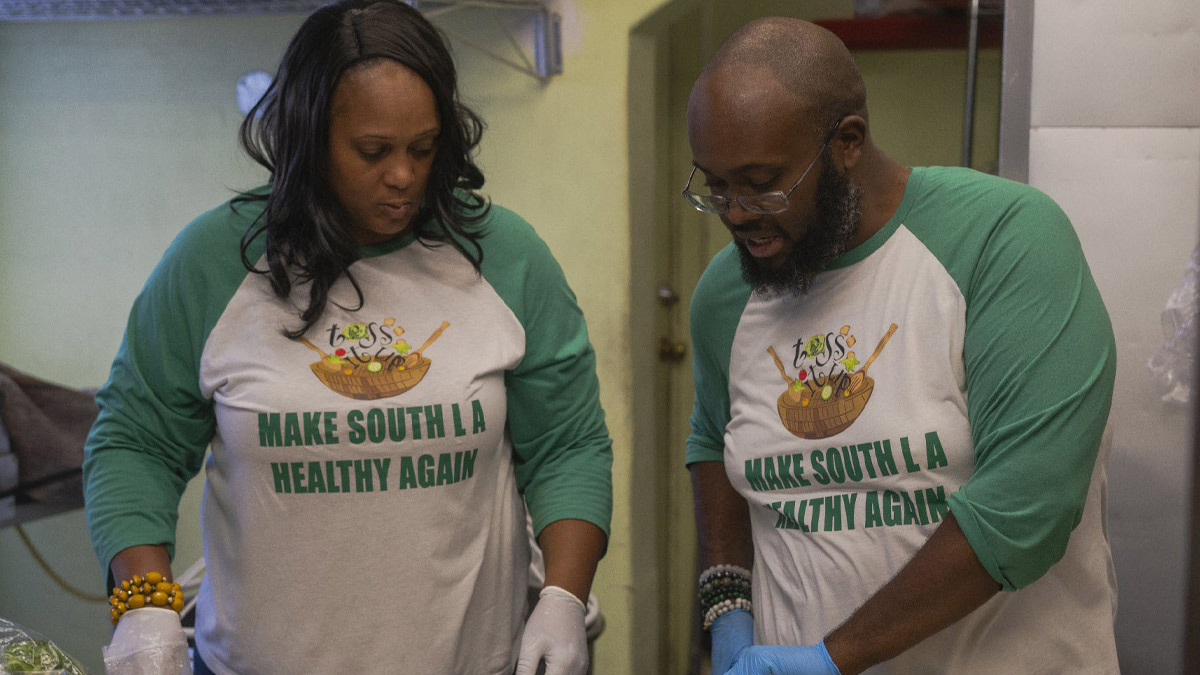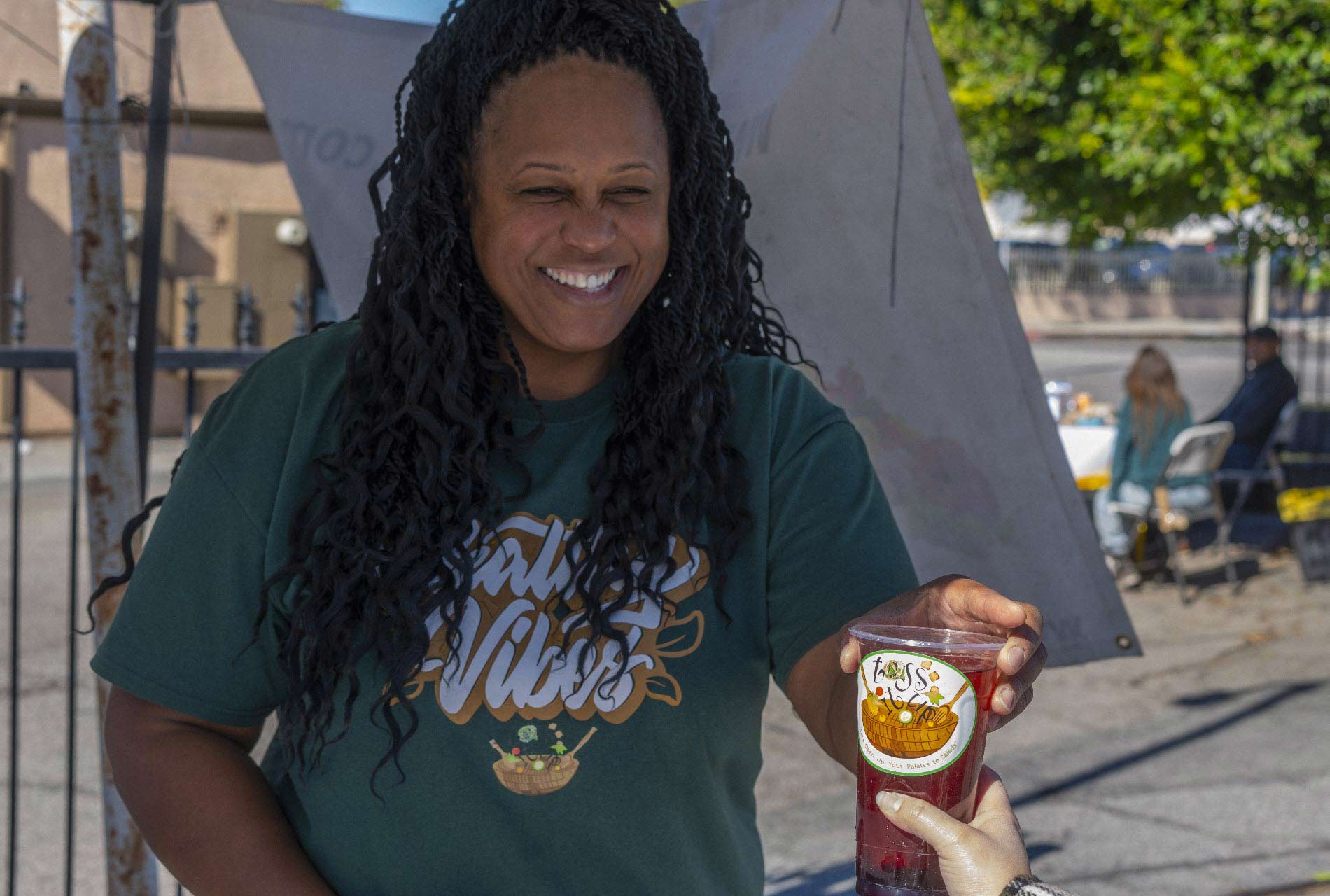Stories
Expanding horizons for Black female entrepreneurs in Los Angeles

U.S. Bank Access Fund’s support for the African American Alliance of CDFIs helped launch a program for minority business owners to strengthen financial acumen.
Six years ago, Javonne Sanders was a bus driver with a vision to start a business that would give back to her hometown of South Los Angeles.
While on the job, she started surveying passengers about what they would like in a local salad bar and, as her co-workers caught wind of her vision, they encouraged her to bring salads to the bus yard. She named her venture Toss It Up, and her first salad for sale – an Apple-cranberry-walnut version – was an instant hit with her co-workers. Not long after, she began selling her salad creations at local farmers markets and pop-up events – bringing fresh and healthy salads to a segment of the community where quality grab-and-go salads are tough to come by.
“I didn’t know these salads would take me this far,” Sanders said. “When I first started my company, I was told that people in South LA don’t eat salads. But they do, you just have to offer it.”
Sanders credits opportunities during the pandemic to provide healthy meals to seniors as key to building a brand and a following for her salad company Toss It Up. Today, Toss It Up provides corporate catering, weekly meal plans and will soon open a storefront within a local convenience store in South Los Angeles.
Her growth plans were serendipitous with the opportunity for her to participate in the inaugural Sister Entrepreneurs Loan Fund (SELF) cohort that local community development financial institution (CDFI) and nonprofit PCR Business Finance kicked off earlier this year. The program, which received indirect grant funding from the U.S. Bank Access Fund via the African American Alliance of CDFIs, focuses on providing financial education, one-on-one advising and business workshops to Black, Indigenous and people of color women business owners in Los Angeles.

PCR Business Finance Small Business Development Center Director Colette Moore said the idea for the program was sprouted during the pandemic when they saw that many minority business owners had “pre-existing conditions” that made it difficult for them to qualify for relief and funding. Additionally, data showed that women-owned businesses permanently closed at a higher rate than the national average over the last two years.
“Since the pandemic, people have not fully recovered, and with the low level of capitalization many are still at a break-even point,” shared Moore. “Our goal through this program is to have them develop the financial acumen to get to that next round and be profitable… we want these ladies to think bigger.”
In early September, 22 business owners graduated from the program, including Sanders. Each graduate received a $2,000 grant to put back into their business and Sanders plans to use her grant on a new point of sale system for her new cafe location. One of the programs goals, in addition to helping participants better run their businesses and increase profits, is to also ensure they are prepared to apply for and receive additional funding when they need it to grow.
When I first started my company, I was told that people in South LA don’t eat salads. But they do, you just have to offer it.
Javonne Sanders, founder, Toss It Up
Fellow graduate Dasha Hunter also used time during the pandemic to build and launch Dash Entertainment Solutions, a visa and passport expediting agency serving the entertainment industry. She made the jump to starting her own agency after working at a company that outsourced similar services.
“When we launched at the end of 2020, it was quiet, no one was traveling so we used that time to get ready,” said Hunter. “Then as restrictions lifted, we had all of this new business, but a skeleton crew.”
Hunter joined the cohort as her business was growing and credits what she learned from the program with helping her finally hire a CFO.
“I always thought I couldn’t afford one, but she’s already paid for herself by finding unpaid invoices,” shared Hunter. “I also realized my business plan was outdated, it wasn’t proper. This program forced me to hone my skills and prioritize what I need to learn right.”
Hunter plans to use her grant funding to develop and test a prototype app that would streamline what is now an email-based process for entertainment professionals to manage visa and passport status applications for their entire entourage. She also credits the program with showing her the importance of creating a legacy with her business.
“It’s taught me that this not a small business, it doesn’t die when I die, it will be generational.”
Tags:
Media center
Press contact information, latest news and more
Learn more
Company facts, history, leadership and more
Work for U.S. Bank
Explore job opportunities based on your skills and location
